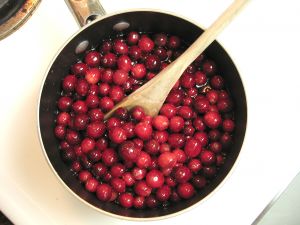
Photo courtesy of http://www.freeimages.com/profile/Keira
It’s pretty much common knowledge that cranberry is good for urinary tract infections. But, just like many other food items, the benefits extend far beyond this.
Let’s face it, though, the berries, as a group, have powerful benefits. Blueberries, strawberries, lingonberries, cranberries. Berries pack a pretty powerful phytonutrient (plant-based protective compound) punch.
And this benefit is across chronic conditions. From cancer to diabetes to heart disease. The studies are quite numerous and consistent. And let’s face it—berries are not too painful to add into a healthy lifestyle.
Sometimes, though, with natural approaches, the way the approach is working may be far outside the realm of what we think it is doing. As an example, when it comes to cranberries, I generally think about the antioxidant / protective compounds the are found in the berries and how they can protect against damage at the cellular level.
In addition, the sugar alcohol (d-mannose) found in cranberries is absorbed into your body but not used. As a result, the d-mannose shows up in the urine where it helps to wash out bacteria present in the urinary tract to provide the well-known benefit for urinary tract infections.
But what if there is something more going on? Something that may have to do with, say….the gut?
Regular readers of the blog know how much I revere any knowledge that can help me understand more about how the microbiome (gut bacterial population) affects health and how I can help patients positively affect their gut.
Which brings us to this particular study. In it, researchers evaluated the effect of a cranberry extract on the gut bacterial flora in a group of mice who were fed a high-fat, high-sugar, pro-diabetic diet. Here’s what they found:
- The cranberry extract slowed down the expected weight gain and abdominal obesity.
- Cranberry treatment, led to less triglyceride accumulation.
- The extract protected against liver oxidative stress and inflammation (the liver weight was less).
- Insulin action was improved (improved insulin tolerance, lower HOMA of insulin resistance and decreased glucose-induced hyperinsulinaemia during an oral glucose tolerance test).
- There was less intestinal inflammation and oxidative stress.
- But, despite all of this, the most interesting finding was that there was a marked increase in the bacterium Akkermansia.
Akkermansia?
Isn’t that just south of Istanbul?
Akkermansia muciniphila is a relatively newly-discovered bacteria present in the gut that has a unique ability to break down mucin. Mucin is a mucous-like compound that lines the entire gastrointestinal tract. Mucin can provide protection to the cells lining the gut, but it can also protect nasty bacteria in your gut that hide behind a layer of mucin from protection.
More importantly, as we see in this study, A. muciniphila seems to have a pretty potent anti-diabetic effect on the organism that it thrives in. So, based on this study, it would seem that cranberry, as both the fruit and the extract, may give you the ability to fight off weight gain and diabetes. Pretty cool.
One quick note: If you choose to use real cranberries, absolutely avoid the sugared-up, sunflower coated variety. See if you can find straight-up cranberries. If this isn’t your speed, you can always check out what your local chiropractic-nutritionist or Amazon has to offer.
